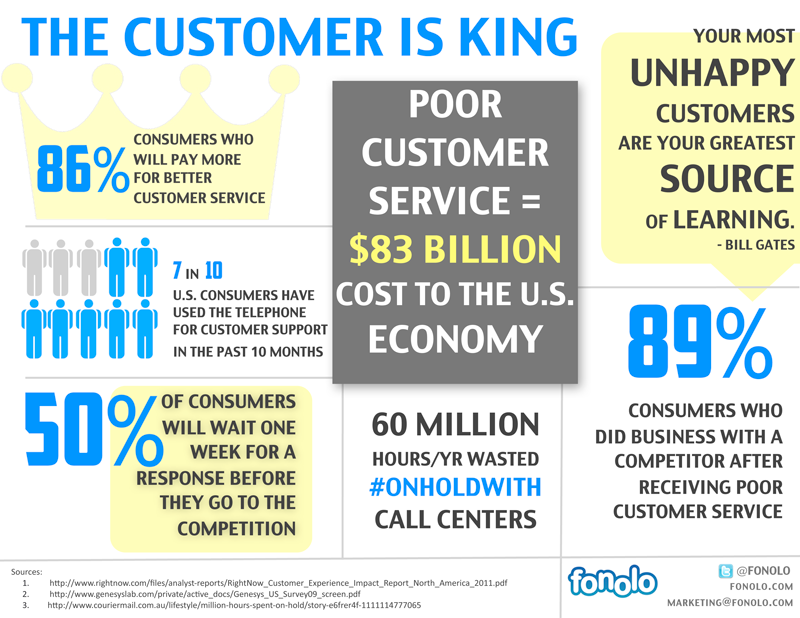Blog

Wednesday Wisdom, Vol.2, Iss 4
The Value of Customer Service
I recently had two terrible customer service experiences with companies that I was quite loyal to. With both companies, I was the disgruntled customer who made very reasonable attempts to voice my concerns and possibly salvage what had otherwise been a great and mutually beneficial relationship. My attempts were to no avail, and I eventually gave up and resolved never to patronize either business again. Along with that resolution came my decision to not participate in any of their social media activity, never refer anyone for their services, and of course, this article.
As a small business owner, I am almost certain that no one intentionally provides bad customer service. In fact, I believe that it is to the detriment of any company to leave out a customer service policy in their company handbook. However, it still seems that with some companies, there is always the employee that did not get the memo about what good customer service is and is not. Unfortunately, the consequences of this are almost always irreversible. On a large scale, a company that provides poor customer service may pay for it in thousands (possibly millions) of dollars, as is the case with the companies that landed on the Huffington Post’s “15 Companies with Impossibly Terrible Customer Service.” On a seemingly smaller, but really equally large scale, are companies that will pay for it with a tarnished reputation and customer attrition.
Here are a few simple tips for ensuring that those in your company are providing good customer service:
Create a culture of valuing relationships. No matter the size of a company, customers should never be treated as identification numbers or revenue-producing zombies. Your customers keep your business going. Without their hard-earned money, Facebook statuses, retweets or word of mouth referrals, a company ceases to exist. To forget that a customer is a stakeholder is nearsighted and could be very dangerous for any business. Create a culture of valuing your customers that starts with valuing all relationships, including employees.
Frequent and effective communication. Nothing causes a disagreement to escalate quicker than miscommunication. To refuse to offer options to mitigate and work through a problem is the equivalent of business suicide. By creating a culture where communication is encouraged, you may find that not only will you get constructive feedback, but positive reviews as well. Both are equally important for improving your service or product.
Never underestimate the power of a bad review! Just as a good review garners attention, so does a bad review. Some businesses, especially start-ups, rely solely on the testimonials of others. In the age of technology and social media, it is easier than ever for a disgruntled customer to create a platform to broadcast their complaint. Small business owners must be prudent in recognizing this.
Agree to disagree. Theoretically, the customer is always right. In reality, that is not always the case. Sometimes the customer is just plain wrong. As a small business owner, your job description should not include trying to prove your point to the customer. Rather, your job is to find the value in all feedback. Whether or not the customer is right is irrelevant. By listening, you may just gain insight on how to take your business to the next level by making your product or service better.
__________________________________________________________________________________________________________________________
Andrena Sawyer is the Founder and President of P.E.R.K. Consulting, a nonprofit and small business consulting company. In addition to her work with nonprofits and start-ups, she leads workshops on personal and professional development for women across the country. Much of her content can be found in her eBook, The Other Side of Assertiveness.











